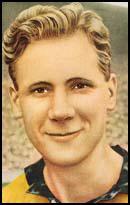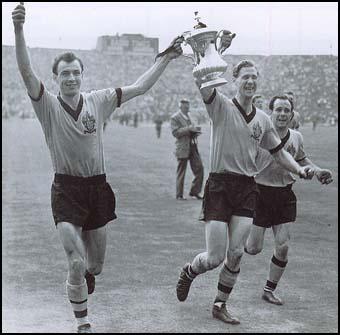Bill Slater

William (Bill) Slater was born in Clitheroe on 29th April 1927. A wing-half or inside-forward, he joined Blackpool as a 16 year amateur in 1944 and made his debut in the first-team against Aston Villa on 10th September 1949. Later that season he scored after eleven seconds in a game against Stoke City. This remains as Blackpool's fastest-ever goal.
The Blackpool manager, Joe Smith, had built up a fine side that included Stanley Matthews, Hughie Kelly, Stan Mortensen, Bill Perry and Harry Johnson. In the 1950-51 season Blackpool finished in 3rd place in the First Division of the Football League.
Blackpool beat Stockport County (2-1), Mansfield Town (2-0), Fulham (1-0) and Birmingham City (2-1) to reach the final of the FA Cup against Newcastle United. The defences were in control in the first-half. The deadlock was broken in the 50th minute when Jackie Milburn collected a pass from George Robledo to fire home. Five minutes later, Ernie Taylor cleverly back-heeled the ball. As Milburn later recalled: "I struck it with all my might and from 28 yards it flew straight as an arrow into the back of the net." The game ended 2-0 and Slater had lost his first FA Cup final.
After finishing college, in December 1951 Slater moved to Brentford. However, he took up a post teaching at Birmingham University and in August 1952 he joined Wolves as a part-time professional. Managed by Stan Cullis, the team included Peter Broadbent, Johnny Hancocks, Sammy Smyth, Jesse Pye, Jimmy Dunn, Jimmy Mullen, Billy Crook, Ron Flowers, Roy Swinbourne, Roy Pritchard, Billy Wright, Bert Williams, Bill Shorthouse and Terry Springthorpe. That season Wolves finished in 3rd place and Slater scored three goals in 17 games.
Wolves won the First Division championship in the 1953-54 season with four more points than their nearest challenger, West Bromwich Albion. They scored an impressive 96 goals. The top goalscorers were Johnny Hancocks (25), Dennis Wilshaw (25), Roy Swinbourne (24), Jimmy Mullen (17) and Peter Broadbent (12). Slater, who was now playing in the wing-half position, played in 38 games.
Slater won his first international cap for England against Wales on 10th November 1954. England won the game 3-2. He held his place for the game against West Germany (3-1). The England team that season included Tom Finney, Stanley Matthews, Len Shackleton, Billy Wright, and Bert Williams.
In the 1954-55 season Wolves lost the services of Roy Swinbourne who was injured early in the season. Despite the goals of Johnny Hancocks (26) and Dennis Wilshaw (20), Wolves could only finish second to Chelsea. Slater scored 7 goals in 34 games that season.
Wolves won the League Championship in 1957-58 by 5 points from Preston North End. The club scored an amazing 103 league goals that season. Jimmy Murray was the club's leading scorer with 32 goals in 45 games.
Slater regained his place in the England team against Scotland on 19th April 1958. England won 4-0 and he held his place in games against Portugal (2-1), Yugoslavia (0-5), Soviet Union (1-1), Soviet Union (2-2), Brazil (0-0), Austria (2-2), Soviet Union (0-1), Soviet Union (5-0) and Scotland (1-1).
Wolves also won the title in the 1958-59 season with 28 wins in 42 games. Once again the forwards were in great form scoring 110 goals. This was seven more than Manchester United and 22 more than third placed Arsenal. Jimmy Murray was the club's leading scorer with 21 goals in 28 games. He was followed by Peter Broadbent (20), Norman Deeley (17) and Bobby Mason (13). Slater scored one goal in 27 games.
In the 1959-60 season the club was beaten into second placed by Burnley. Once again Wolves were the top scorers in the league with 106 goals. They did even better in the FA Cup that season with Norman Deeley scoring two of the goals in the 3-0 victory over Blackburn Rovers. That year the Football Writers' Association (FWA) named him as the Footballer of the Year.

.
In the 1960-61 season Wolves finished in 3rd place behind Tottenham Hotspur. The following season they finished 5th. After making 339 appearances and scoring 25 goals for Wolves he joined Brentford in July 1963. However, he only played in five games for his new club before retiring from professional football.
Slater was Director of Physical Education first at Liverpool University and then Birmingham University. In 1982 he was awarded the Order of the British Empire for his services to sport. In 1984 he became Director of National Services and in 1989 was elected as President of the British Gymnasts Association. In 1998 he was awarded the CBE.
Bill Slater died aged 91 on 18th December, 2018.
Student Activities
Primary Sources
(1) Ron Flowers, For Wolves and England (1962)
Bill Slater, the English international half-back, who is on the teaching staff of Birmingham University, is another Wolverhampton captain who has impressed all who have played with him. Bill, as you would expect, is a great soccer student. With his polish, ability to speak fluently, and tremendous zest for football, Bill Slater has emerged as an outstanding skipper
Unlike so many men possessing similar qualities, Bill is, in addition, a player who fights from the beginning to the end of every match. No game is lost until it is won, is the attitude Bill takes, and he spreads it through the team he skippers. In brief, while having revealed himself an outstanding scholar, Slater at the same time has proved to the world he also possesses the ability to lead men. And to win their respect.
To some there may be occasions when Bill Slater may appear to be something of a sergeant-major as he drives his colleagues on to greater efforts.
(2) Brian Glanville, The Guardian (20th December, 2018)
The footballer Bill Slater, who has died aged 91, was a key member of the great Wolverhampton Wanderers side of the mid-to-late 1950s that won three league titles and then an FA Cup. He also played with distinction for England in the 1958 World Cup in Sweden.
A Wolves player for more than a decade, from 1952 until 1963, Slater made more than 300 appearances for the club, first as an inside-forward and latterly as a cool and authoritative centre-half, winning the First Division title in 1954, 1958 and 1959 and, as skipper, the FA Cup against Blackburn Rovers in 1960, when he was voted the football writers’ footballer of the year.
He won 12 caps for England between 1954 and 1960, including four in the 1958 World Cup finals; he appeared in all his country’s matches, the first two at left-back and then in midfield. In the second match of the campaign, against Brazil, he was given the difficult task of marking Didi, the gifted and intelligent hub of the Brazilian midfield, and did so well that the game ended 0-0. After three draws in the group stage, England went out to the Soviet Union in a playoff before the quarter-finals.
